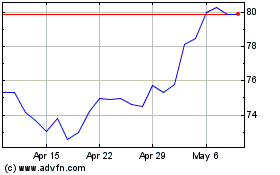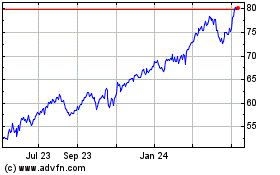AIG Unit to Pay $20 Million to Settle SEC Probe of Teacher-Retirement Business--Update
July 28 2020 - 9:30AM
Dow Jones News
By Dave Michaels and Anne Tergesen
A unit of American International Group Inc. agreed to pay $20
million to settle claims that it failed to disclose payments
intended to draw more business to the firm, the first case to
emerge from a crackdown on practices in the market for teachers'
retirement plans.
Florida teachers saving for retirement through 403(b) plans --
similar to corporate 401(k) plans -- weren't told about an
arrangement by which Valic Financial Advisors Inc. paid hundreds of
thousands of dollars to an entity owned by a local affiliate of the
Florida Education Association, which in turn promoted Valic's
services, the Securities and Exchange Commission said Tuesday.
Valic benefited in two ways: Teachers bought its annuity
products and signed up as clients of its investment-advisory
business, paying Valic an annual fee to manage all of their
assets.
The case against Valic, which neither admitted nor denied the
SEC's civil claims, is the first to emerge from an enforcement
crackdown launched in 2019 and focused on sales practices in the
approximately $1 trillion 403(b) market.
"We are pleased to have resolved these matters involving VALIC
Financial Advisors, which is taking all necessary steps to ensure a
robust program of disclosure improvements and governance
enhancements," the company said.
The SEC didn't name the Florida Education Association or its
affiliates in its settlement order, but The Wall Street Journal
reported the SEC's investigation of Valic and the company's
arrangement with the affiliate of the Florida teachers' unions in
2019.
"When I learned that our nation's educators -- who provide such
an important service, often at great personal and financial
sacrifice -- often were not appropriately informed regarding
essential aspects of their investment options, I was disturbed,"
SEC Chairman Jay Clayton said Tuesday. "We launched our Teachers
Initiative with the objective of bringing our resources --
including enforcement, examinations and investor education -- to
benefit these investors, including through rooting out fraud and
misconduct."
The SEC continues to investigate the 403(b) market, people
familiar with the matter said.
The SEC's investigation found Valic paid the salaries of three
employees at the entity linked to the Florida union. At meetings
and seminars where teachers sought investment advice, the three
touted Valic products, presenting themselves as workers for the
union entity and not disclosing they were also paid by Valic, the
SEC said.
The Journal reported in December that the union entity was known
as Creative Benefits for Educators. As recently as October 2019,
teachers' unions in central Florida were advising members to take
retirement questions to Mary L. Thomas, a consultant at the
union-owned firm -- and a longtime Valic sales representative,
according to regulatory records.
After the Journal asked about her dual role, the Creative
Benefits website went dark last fall. At the time, a spokesman for
Creative Benefits said that it no longer employed Ms. Thomas and
two other consultants.
Teachers who bought Valic's Portfolio Director, an annuity
popular in teachers' retirement plans, paid fees of up to 2.3% of
assets annually. Valic earned $29 million from its annuity products
sold during the 13 years it dealt with Creative Benefits. As part
of the settlement with the SEC, Valic agreed to charge lower fees
to teachers who signed up to have their money managed by the
company, under a "wrap-fee" program.
Valic Financial Advisors manages over $21 billion and has more
than 318,000 individual-investor clients, according to its most
recent regulatory disclosure filed with the SEC.
In a separate settlement with the SEC also announced Tuesday,
Valic agreed to pay $19.9 million to resolve claims that it steered
clients into higher-fee mutual funds without clearly telling them
about cheaper alternatives.
The case involves 12b-1 fees, continuing charges levied against
investor assets that typically reward financial advisers who sell
mutual funds. Nearly 100 investment advisory firms last year agreed
to deals with the SEC that required them to refund the fees to
investors. The firms reported their own misconduct to the SEC under
a program that waived penalties because they cooperated with the
investigation.
Valic didn't participate in the self-reporting program, the SEC
said. In Valic's case, clients were placed in funds that charged
continuing fees even though they had deals with Valic that
suggested they were eligible for a cheaper version of the fund, the
SEC said.
Write to Dave Michaels at dave.michaels@wsj.com and Anne
Tergesen at anne.tergesen@wsj.com
(END) Dow Jones Newswires
July 28, 2020 09:15 ET (13:15 GMT)
Copyright (c) 2020 Dow Jones & Company, Inc.
American (NYSE:AIG)
Historical Stock Chart
From Mar 2024 to Apr 2024

American (NYSE:AIG)
Historical Stock Chart
From Apr 2023 to Apr 2024
